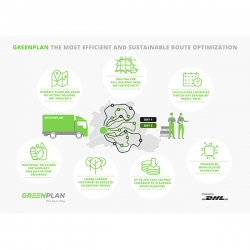Products on show
Time-dependent travel time software
Greenplan
 Built in cooperation with the Research Institute for Discrete Mathematics at the University of Bonn in Germany, Greenplan’s time-dependent travel time software shows how to plan routes in a truly efficient and effective way.
Built in cooperation with the Research Institute for Discrete Mathematics at the University of Bonn in Germany, Greenplan’s time-dependent travel time software shows how to plan routes in a truly efficient and effective way.
One of the most important features of Greenplan’s route planning algorithm is its time-dependent travel times which enable drivers or technicians to arrive at their destinations in the shortest possible time. Time-dependent travel times consider the traffic flow velocity in all areas and on all possible routes depending on the time of day and, therefore, can find the fastest routes dependent on these different traffic patterns.
The University of Bonn conducted a scientific study in New York City and nine other global metropoles to showcase the efficiency and effectiveness of using time-dependent travel times. The study highlighted the existing issue in route planning: you either have to plan according to the lowest (worst-case) travel times in traffic or according to the average travel times.
In choosing either one of the options, the dispatcher must decide between the inherent disadvantages. The worst-case scenario enables the fulfillment of all time windows and, therefore, avoids late deliveries. However, this is not cost-efficient at all and results in an 8% loss in cost efficiencies – in comparison to planning routes with time-dependent travel times. When planning with average travel times, on the other hand, these cost inefficiencies can be avoided, but they result in missed time windows and, thus, late deliveries. Therefore, the classic approach to route planning means companies must decide between inefficiency or ineffectiveness in the form of missed time windows. The study, however, showed that route planning with time-dependent travel times can fix these issues.
Using time-dependent travel times resulted in an advantage in costs of 8.1% in comparison to using worst-case travel times without any late deliveries. Further, time-dependent travel times were also found to save 0.2% in costs, in comparison to average travel times – the latter coming with a total of 1,564 late deliveries compared to none for time-dependent travel times.
Therefore, time-dependent travel times negate the disadvantages of the classic approaches to route planning and can significantly improve cost efficiencies. Greenplan’s routing algorithm considers time-dependent travel times and helps save time and money and deliver more reliability. For more information on how time-dependent travel times work and how to implement them visit Greenplan’s booth at Parcel+Post Expo.